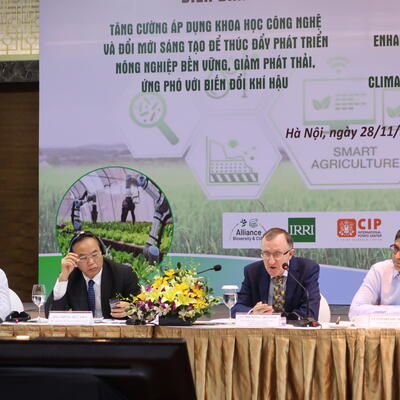
Reducing antimicrobial use in Uganda’s poultry value chain – BuildUganda project aims to manage risks through tested interventions

East Africa youth inclusion program participant Vivian Lukyamuzi holds one of her chickens in Wamala, Uganda (Photo Credit: Heifer International).
Last month, the BuildUganda research for development project was launched at a workshop with stakeholders. One of the four components of the project is focused on antimicrobial use (AMU) in Uganda’s poultry sector. During the workshop, component leaders shared their aims and plans for this component, soliciting feedback and guidance from stakeholders on its focus, deliverables, partnerships and field sites.
This component specifically aims to understand current antimicrobial use in poultry value chains, assess risks to humans from poultry-associated antimicrobial resistance (AMR), support evidence-based policy dialogue for antimicrobial surveillance and AMR strategies and build capacities of value chain actors, implementers and researchers.
Emerging resistance against antimicrobials is a big concern for livestock production and public health. In recognition of this global problem, the Ugandan government has developed a national action plan (NAP) for antimicrobial resistance which #BuildUganda will support through the current research activities. Some of the aims include identifying what antimicrobials are most commonly used by the poultry farmers in commercial and smallholder production systems as well as understanding why they are applied, i.e. are they being used because of lack of options to control poultry disease or purely for profit oriented purposes such as growth promotion.
In upcoming workshops, the project will further discuss the feasibility, challenges, and constraints in implementing the NAP in the Ugandan poultry sector, and involve representatives from other countries such as Kenya to support continued review of the NAP as more evidence from research in Uganda evolves. The insights from these assessments and interactions will be the basis for training activities for value chain actors on rational drug use.
Participants at the June 2019 launch workshop provided insights on existing challenges that will be considered during the program implementation: These include lack of sufficient regulation and enforcement; lack of rapid tests for food residue testing, lack of options to antimicrobials such as efficient vaccines, lack of qualified extension staff such as veterinarians and paravet staff which leads to charlatanry because farmers are desperate for advice on how to keep their animals healthy. Other ideas discussed included a certified ‘out-growers’ scheme to encourage producers to register and be trained in rational drug use and other good agricultural practices as well as several channels for awareness campaigns
#BuildUganda partner Bernd-Alois Tenhagen of the German Federal Institute for Risk Assessment (BfR) visited the local poultry farms and says ‘I see significant challenges but we hope to apply our models to recognize the risk and protect health which are the two tasks that BfR is committed towards independent and progressive consumer protection.’
Brian Kyangulangyi, sales manager at Kampala-based Biyinzika Poultry International Ltd, a poultry breeder and supplier of day-old-chicks, elaborated that currently the company supplies feeds and supplements to commercial poultry farms as well as smallholder poultry farms. The company rears chickens and also dresses 6,000 per day. Kyangulangyi added ‘We are keen to promote good management practices and have invested in veterinarians on the farms and we avoid using antimicrobials. Our company aims to understand the way farms manage chickens, and we aim to change mindsets on rearing chickens because poor management results in diseases which inevitably leads to the use of antimicrobials on these farms.’
Richard Erechu, the #BuildUganda AMR representative from MAAIF added ‘the AMR sector is being prompted to realize that in order to fight poverty, the government needs to support the activities’.
Karim Wanga from the Ministry of Health in Kenya says ‘AMR is a OneHealth problem and farmers are using antibiotics for humans on animals, it is important to understand where the residues that cause resistance are coming from.’
Dieter Schillinger, deputy director general leading the bioscience directorate at ILRI acknowledged the investment by BMZ as a strong recognition of the importance of livestock in Uganda and anticipates a wider collaboration with the Ugandan government on other programs. He also anticipates additional collaboration with BMZ in Africa to improve animal health and by doing so improving livelihood of smallholder livestock farmers in Africa.
In the next six months, the steps include: engaging the AMR National Action Plan taskforce and reviewing what has been done in Uganda. Identify gaps that can be takled under this project, carry out a survey of value chain actors, and prepare prevalence surveys and transmission studies for next year.
BuildUganda is a research for development collaboration to prevent and tackle animal diseases and zoonoses in Uganda. Led by the International Livestock Research Institute and the Ministry of Agriculture, Animal Industry and Fisheries, it mobilizes national and international research and development partners from Uganda, Kenya and Germany. The five-year program is funded by the Federal Ministry for Economic Corporation and Development (BMZ) and the CGIAR research programs on Livestock and on Agriculture for Nutrition and Health (A4NH).
For more information, contact Kristina Roesel, program coordinator, k.roesel@cgiar.org
Additional information:
- ILRI news item on the project
- AMR Hub news item
- ILRI project brief
- Presentations and reports from the project
- CGIAR AMR hub





















